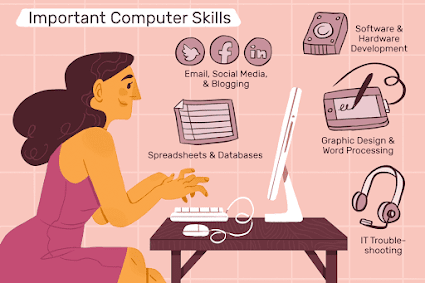10 Practical Tips to Enhance Your Computer Skills
Improving computer skills can be a valuable asset in today's technology-driven world. Whether you are a beginner or have some experience, here are some practical tips to help you enhance your computer proficiency:
Set Clear Goals:
Determine what specific computer skills you want to improve. For example, you might want to become proficient in using specific software, enhance your typing speed, or learn to troubleshoot common computer issues. Having clear goals will guide your learning process and keep you focused.
Take Online Courses and Tutorials:
There are numerous online platforms offering courses and tutorials on various computer skills. Websites like Udemy, Coursera, Khan Academy, and YouTube have a wide range of free and paid courses covering topics such as basic computer operations, software applications, coding, and more. Find courses that match your interests and learning style.
Practice Regularly:
Consistent practice is essential to improving computer skills. Set aside dedicated time each day or week to practice what you've learned. Whether it's using word processing software, coding exercises, or learning shortcuts, regular practice will help reinforce your knowledge and develop muscle memory.
Join Online Forums and Communities:
Engage with online communities and forums related to computer skills. Participate in discussions, ask questions, and share your knowledge with others. Not only will this help you learn from experienced users, but it will also keep you motivated and accountable.
Read Tech Blogs and News:
Stay updated with the latest trends and developments in the tech world by reading blogs, news articles, and technology-related websites. Understanding the latest advancements will give you a broader perspective on how to use computers more effectively.
Customize Your Computer Settings:
Explore and customize your computer's settings to suit your preferences and workflow. Adjust display settings, keyboard shortcuts, and accessibility options to optimize your user experience.
Learn Keyboard Shortcuts:
Keyboard shortcuts can significantly speed up your computer tasks and productivity. Take the time to learn commonly used shortcuts for your operating system and applications you frequently use.
Seek Hands-on Experience:
Volunteer for computer-related tasks at your workplace, school, or community organizations. Practical experience will reinforce your learning and provide opportunities to troubleshoot real-world issues.
Teach Others:
Teaching is an excellent way to solidify your knowledge. Offer to help friends or family members with their computer issues or mentor someone who is just starting to learn. Explaining concepts to others will enhance your understanding and communication skills.
Stay Curious and Patient:
Learning new skills, especially related to technology, requires patience and a curious mindset. Be open to experimentation and don't be afraid to make mistakes. Embrace challenges as opportunities for growth.
Remember, improving computer skills is a continuous process, and taking it one step at a time is okay. With dedication, practice, and a positive attitude, you'll steadily enhance your computer proficiency and become more confident in using technology.




Comments
Post a Comment